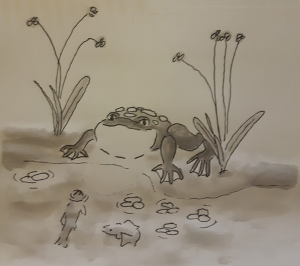Difference between revisions of "Lantern Toad"
From World of Entorais Wiki
Jump to navigationJump to search (content) |
m (→About: layout) |
||
| Line 3: | Line 3: | ||
;Common Names:Lantern Toad, Glow Toad | ;Common Names:Lantern Toad, Glow Toad | ||
;Classification:Amphibian | ;Classification:Amphibian | ||
The Lantern Toad, or Glow Toad, produces a variable bio-luminescent yellow-orange glow in the warts on its back, and when inflating its throat pouch. The toad uses this glow to draw in insects and minnows or other small amphibians which it eats. | :The Lantern Toad, or Glow Toad, produces a variable bio-luminescent yellow-orange glow in the warts on its back, and when inflating its throat pouch. The toad uses this glow to draw in insects and minnows or other small amphibians which it eats. | ||
==Description== | ==Description== | ||
Revision as of 02:19, 22 June 2021
About
- Common Names
- Lantern Toad, Glow Toad
- Classification
- Amphibian
- The Lantern Toad, or Glow Toad, produces a variable bio-luminescent yellow-orange glow in the warts on its back, and when inflating its throat pouch. The toad uses this glow to draw in insects and minnows or other small amphibians which it eats.
Description
- Size
- <2.5 kg (<5 pounds), 12-15 centimetres (4-6 inches) in length.
- Appearance
- Large brown toad with yellowish warts on back and legs. Webbed feet, and a large inflatable throat pouch yellow in colour.
- Sexual Dimorphism
- No obvious difference between the sexes.
- Variance
- Some species specific differences in colouration, size, or patterning exist.
Ecology
- Habitat
- Tropical to Temperate Freshwater Wetlands.
- Diet
- Lantern Toads eat a variety of small animals, insects, worms, minnows, and other amphidians or lizards.
Behaviour
- Social grouping
- Solitary
- Temperament
- Wary
- Intelligence
- Animal
- Reproduction
- Lantern Toads mate and the females lay clumps of upwards of 50 eggs in shallow standing water. These eggs mature and hatch into legless larval toads which swim about eating a variety of small insects and other food animals. They grow legs over time, and eventually lose their tails, at which point they switch from a purely aquatic juvenile to a amphibious adult.
- Wintering
- During winter in climates where it is cold enough for surface water to freeze, Lantern Toads will hibernate, burying themselves in soft mud or soil, and emerge in the early spring following the thaw.
Sub-Species
Domestication
- General
- Lantern Toads have not been domesticated, although a few are kept as curiosities.
- Resources
- Meat. Some arcanists utilize these toads and parts thereof in potions or other charms.
